Tribunal Statistics Quarterly, April to June 2020
Updated 9 December 2021
1. Main Points
This publication gives tribunal statistics for the latest quarter (April to June 2020, Q1 2020/21), compared to the same quarter the previous year. This quarter’s publication does not include Social Security and Child Support (SSCS) and Immigration and Asylum (IA) data due to issues identified as these tribunals were migrated to a new operational system. The data will be made available as soon as this is resolved and the data quality assured. This bulletin will focus on all the other individual tribunals only and not the overall picture as the excluded tribunals forms a large proportion of the overall caseload.
For technical detail about data sources, quality, policy changes and terminology, please refer to the accompanying Guide to Tribunal Statistics.
| Single ET claims received continued to rise following the abolition of ET fees The trend in multiple claims is volatile |
Single Employment Tribunal (ET) receipts and caseload outstanding increased, by 18% and 31% respectively, compared to a year ago. Disposals decreased by 21%. Multiple ET receipts and disposals decreased by 43% and 47% respectively, over the same period, while caseload outstanding increased, by 6%. |
| Annual discrimination compensation and costs awarded figures published | In 2019/20, sexual orientation discrimination claims received the largest average award (£28,000) compared to other discrimination jurisdictions. The highest maximum award in 2019/20 was for disability discrimination, at £266,000. |
| SEND receipts decreased while disposals and caseload outstanding increased | SEND receipts fell, by 6%, compared to the same period in 2019. Disposals and caseload outstanding rose, by 17% and 2% respectively. |
For feedback related to the content of this publication, please contact us at CAJS@justice.gov.uk
2. Statistician’s Comment
This quarter’s publication does not include SSCS and IA tribunals due to data issues identified during quality assurance. In line with the Code of Practice for Statistics we would normally not release partial statistics. However, tribunals cover independent jurisdictions with different audiences for each tribunal. The MOJ Chief Statistician and Head of Profession for Statistics has taken the decision to release a partial publication as doing so reflects the public interest and usage of these statistics.
Trends in Tribunals receipts and appeals is mainly driven by the impact of Covid-19 and related measures put in place by the different jurisdictions. There has a been a fall in receipts and disposals across many of the jurisdictions reported on. However, an increase in unemployment rates across the country due to the impact of Covid-19 on the economy has led to the highest level of Single ET claims since 2012/13, and an increase in the outstanding caseload. This rise in Employment receipts is likely to continue as the government’s Job Retention scheme comes to an end at the end of October.
Constraints on court resources has meant there has been a fall in disposals in all main jurisdictions except Employment Tribunals, Mental Health and Special Educational Needs and Disability - where there was an increase up to June 2020.
As part of measures to cope with demand, additional venues – referred to as Nightingale courts - have been provided to add temporary capacity to hear cases and help the court and tribunal system to run as effectively and safely as possible during the coronavirus pandemic. To support access to justice, audio and video technology capability has also been increased, enabling judges to conduct remote hearings to a far greater degree.
3. Employment Tribunals
Employment tribunal single cases
In April to June 2020, single claim receipts increased by 18%, while disposals decreased by 21%, when compared to the same period in 2019. Outstanding caseload rose by 31%. Mean age at disposal was 32 weeks, one week less than in April to June 2019.
Employment tribunal multiple cases
Receipts and disposals fell, by 43% and 47% respectively, this quarter when compared to the same period in 2019. Caseload outstanding increased by 6% respectively. Mean age at disposal fell from 140 weeks to 55 weeks over the same period.
Figure 1.1: Index of Employment Tribunals single and multiple claim receipts, Q1 2009/10 – Q1 2020/21 (Source: Tables S_2)
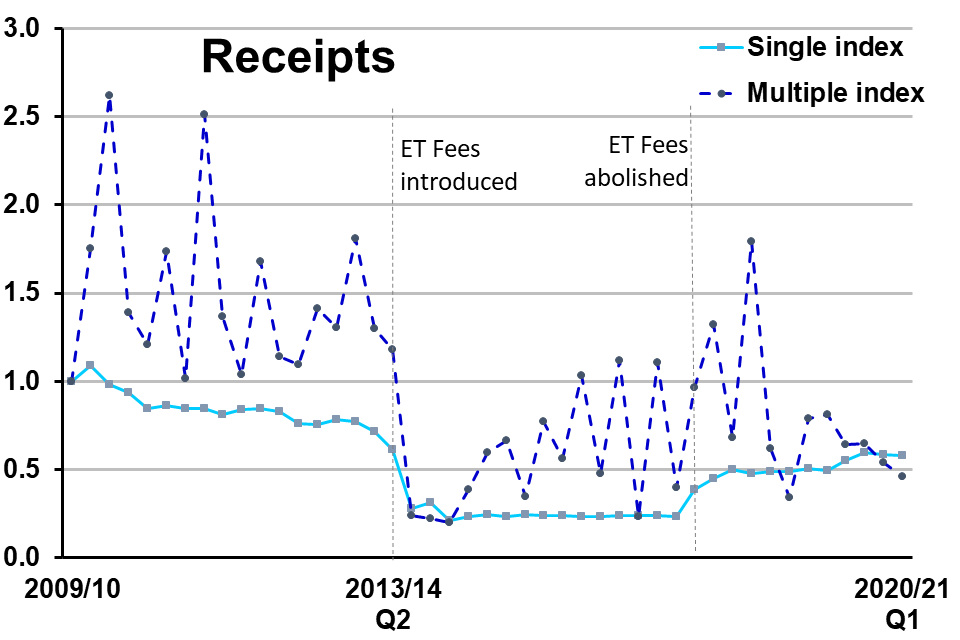
* Baseline 2009/10 Q1
Figure 1.2: Index of Employment Tribunals single and multiple claim disposals, Q1 2009/10 – Q1 2020/21 (Source: Tables S_3)[footnote 1]
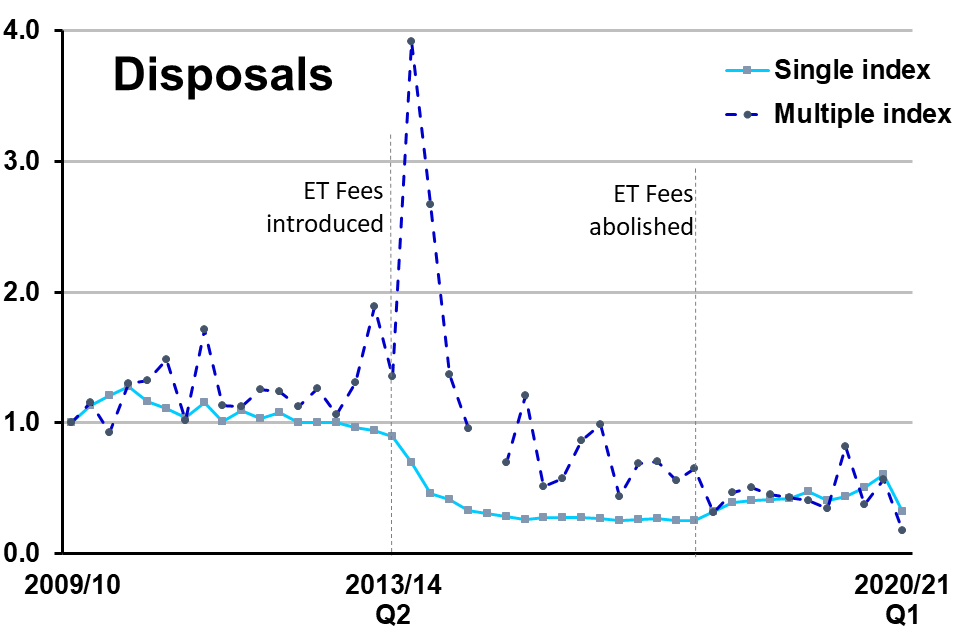
* Baseline 2009/10 Q1
Figure 1.3: Index of Employment Tribunals single and multiple claims outstanding, Q1 2009/10 – Q1 2020/21 (Source: Tables S_4)
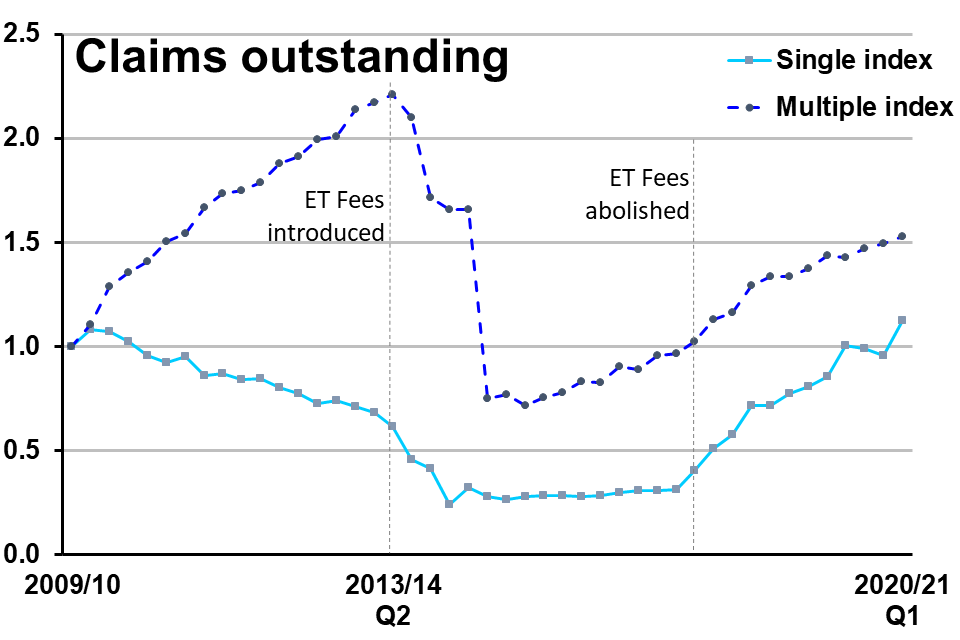
* Baseline 2009/10 Q1
The number of single claim receipts has increased by 18% to 10,000 in the current quarter, when compared to the same period in 2019, most likely due to the rise in unemployment and changes to working conditions during the COVID-19 pandemic. Caseload outstanding (at 37,000) has passed the peak levels seen in 2009/10 (when it was 36,000 in Q2 of that year), driven by the increase seen in single claim receipts and the reduction in disposals.
There were 11,000 multiple claims received this quarter, down 43% on the same period last year. Multiple claims tend to be more volatile as they can be skewed by a high number of claims against a single employer. The multiple claims received this quarter related to 720 multiple claim cases (averaging 12 claims per multiple case). This is up from 670 multiple cases in the same period a year ago, which had an average of 15 claims per case.
The Employment Tribunal disposed of 6,400 claims during April to June 2020, down 31% on the same period in 2019. This decline in disposals is likely due to COVID-19 related impacts on the tribunals. This was due to a 21% and 47% decrease in single and multiple claim disposals (to 4,500 and 1,900) respectively. The multiple claims disposed of relate to 290 multiple cases, down from 400 cases in April to June 2019.
In April to June 2020, 26% of disposals were withdrawn (the most common outcome this quarter), 23% were ACAS[footnote 2] conciliated settlements, 19% were dismissed upon withdrawal, 9% were struck out (not at a hearing) and 8% were default judgements. The most common jurisdictional complaint disposed of between April to June 2020 was ‘Unfair Dismissal’, whereas ‘Unauthorised Deductions’ was the most common complaint in April to June 2019.
Employment Tribunal Fee (ET) Refunds
From the launch of the ET fee refund scheme in October 2017 to 30 June 2020, there were 22,000 applications for refunds received and 22,000 refund payments made, with a total monetary value of £18.2 million.
Between 1 April 2020 and 30 June 2020, 15 refund applications were received (down from 34 in Q4 2019/20) and 81 refund payments[footnote 3] were made with a total value of £87,000.
The ET fee refund scheme[footnote 4] was introduced as a phased implementation scheme in October 2017 following the abolition of ET fees on 26 July 2017. Since the introduction of the scheme, a total of 22,000 applications for refunds have been received and 22,000 payments have been made, with a total value of £18,156,000 as at 30 June 2020.
Of the applications received between April to June 2020, 87% (13 applications) related to cases initially brought in England and Wales, up from 79% in the quarter to 30 March 2020. The remaining 13% of applications received this quarter (two applications) related to cases initially brought in Scotland.
In the quarter April to June 2020, 81 refund payments were made by the MoJ, with a total monetary value of £87,000. Of these 81 refund payments made:
-
93% (75 refunds) related to England and Wales, 7% (six refunds) to Scotland.
-
98% (79 refunds) related to single claims, 2% (two refunds) related to multiple claims.
Figure 1.4: Employment Tribunal fees – refund applications received, Q3 2017/18 – Q1 2020/21 (Source: Tables ETFR_1)

Figure 1.5: Employment Tribunal fees – refund applications processed, Q3 2017/18 – Q1 2020/21 (Source: Tables ETFR_1)
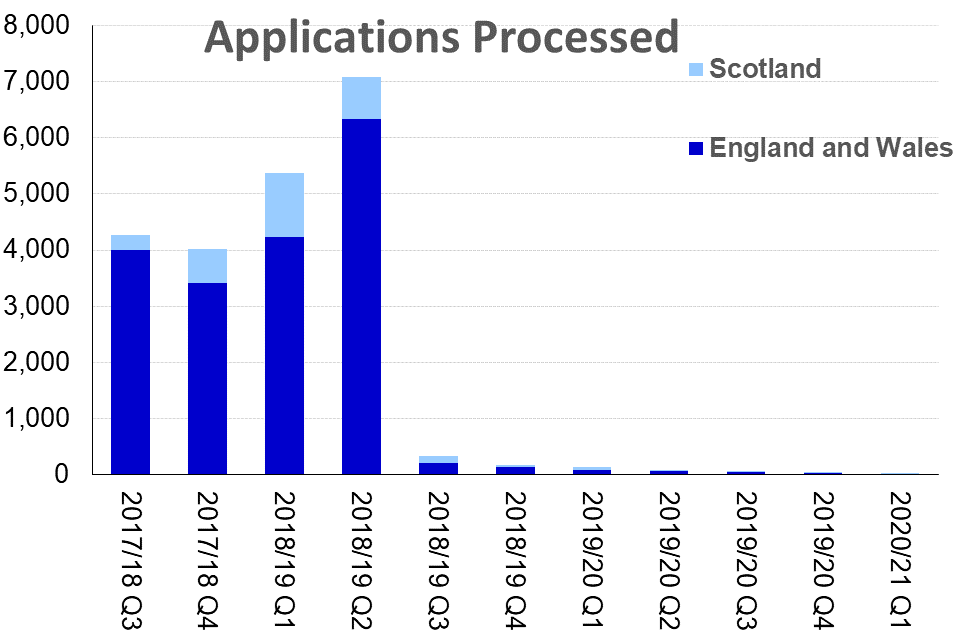
Figure 1.6: Employment Tribunal fees – refund payments made, Q3 2017/18 – Q1 2020/21 (Source: Tables ETFR_2)
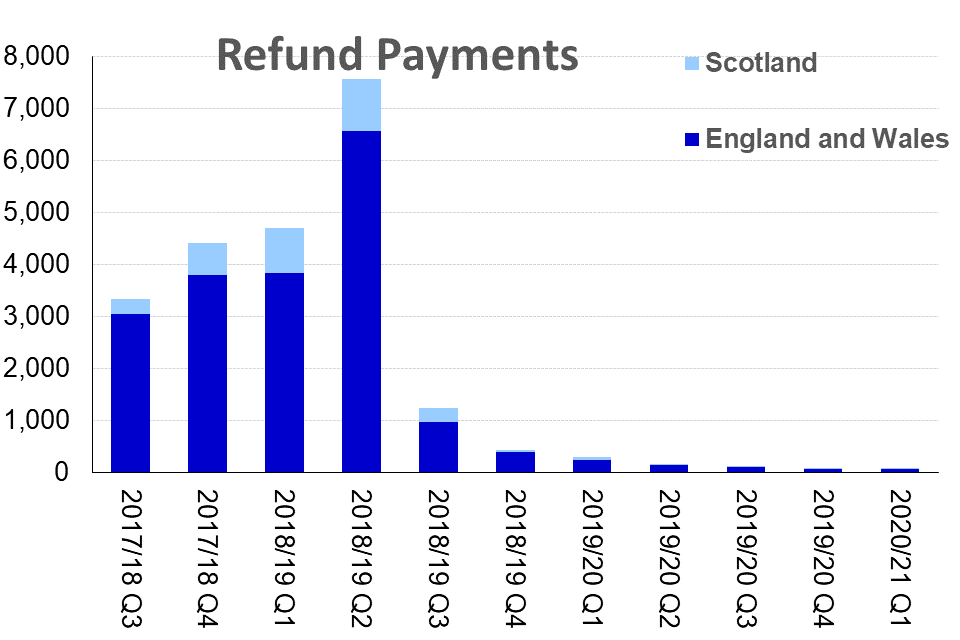
The large drop seen between Q2 and Q3 2018/19 follows the mailshot campaign which ended in July 2018 and resulted in exceptionally high receipts initially, particularly in England and Wales.
4. Employment Tribunal and Employment Appeal Tribunal, 2019/20
Employment tribunal Representation
Over half of claimants (56%) were represented by a lawyer[footnote 5] in 2019/20, down from 64% in 2018/19. In contrast, 32% of claimants in 2019/20 had no representation recorded[footnote 6], up from 21% in 2018/19.
Costs and Compensation[footnote 7]
In 2019/20, sexual orientation discrimination claims received the largest average award (£28,000) compared to other discrimination jurisdictions. The highest maximum award in 2019/20 was for disability discrimination, at £266,000.
Claimant representation is recorded at the time of application and may change as a case progresses. The proportion of claimants represented by a lawyer in 2019/20 was 56%, nine percentage points lower than in 2018/19. Representation information was not provided for 32% of claims, up from 21% of claims in 2018/19. The number of claims represented by a lawyer has shown a declining trend during the last 3 years, whilst during the same period there has been an increasing trend in the number of claims with no representation (or where no rep information is provided), this could therefore suggest that claimants are taking advantage of the online system. Since the introduction of the online system a number of improvements have been made and a direct link to the form can be found on Gov.uk website, improving accessibility.
Figure 2.1: Representation of claimants at Employment Tribunals, 2005/06 to 2019/20

Centrally collated cost and compensation data is only published for Unfair Dismissal and each of the discrimination based cases. In 2019/20, there were 580 claims that received compensation for Unfair Dismissal (down 12% compared to 2018/19), where the maximum award was £119,000 and the average (mean) award was £11,000. The number of unfair dismissal claims receiving compensation has been falling since 2010/11, only rising in 2018/19 (from 540 claims in 2017/18 to 660 claims).
There were 160 discrimination cases where compensation was awarded in 2019/20; the maximum amount awarded (£266,000) was in the Disability Discrimination jurisdiction.
Employment Appeal Tribunals (EAT)
In 2019/20, the Employment Appeal Tribunal received 1,400 appeals (up 9% on 2018/19) and disposed of 1,100 appeals (remaining stable compared to 2018/19).
In 2019/20, 23% of appeals dealt with at a preliminary hearing were dismissed (16 of 70 appeals). This proportion is higher for appeals brought by employees, where 24% of appeals were dismissed compared to 20% of appeals brought by employers which were dismissed.
Of those appeals that reached an EAT final hearing, 61% were dismissed at full hearing, similar to the percentage dismissed for appeals brought by employees and for appeals by employers.
Figure 2.2: Outcome of EAT Disposals, 2009/10 to 2019/20
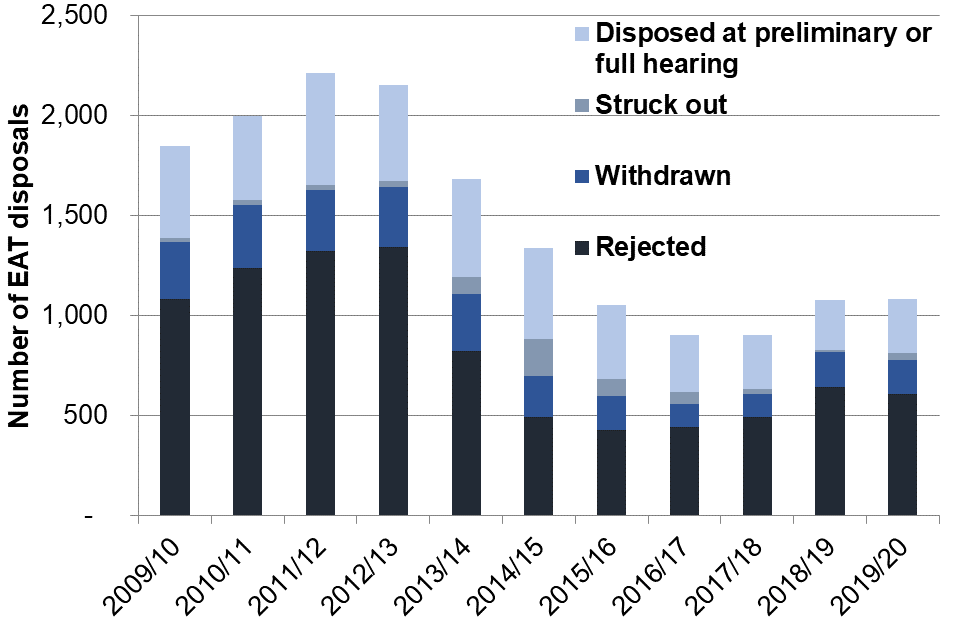
5. Special Educational Needs and Disability (SEND)
There were 2,100 receipts and 1,800 disposals for the SEND tribunal in Q1 2020/21; 2,700 applications were outstanding at the end of the same quarter
The SEND tribunal receipts fell by 6% (to 2,100) in Q1 2020/21 when compared to the same quarter in 2019/20. SEND receipts fell between Q2 2019/20 and Q3 2019/20 (from 2,200 to 1,500) before rising in Q4 2019/20 and Q1 2020/21.
The number of SEND disposals rose by 17% (to 1,800) in April to June 2020 compared to the number of disposals in April to June 2019. When comparing one quarter to the next quarter, SEND disposals have fallen slightly in each quarter since Q3 2019/20.
SEND caseload outstanding at the end of Q1 2020/21 increased by 2% (to 2,700) when compared to the end of Q1 2019/20.
Figure 3: Registered SEND appeals, Q1 2010/11 to Q1 2020/21 financial year (Source: Tables S_2, S_3 and S_4)

6. Gender Recognition Certificates
87 Gender Recognition Panel (GRP) applications were received and 83 were disposed of between April to June 2020; 150 applications were pending by the end of June 2020
5 fewer applications were received by the GRP this quarter, compared to April to June 2019. Of the 83 applications disposed of, a full Gender Recognition Certificate (GRC) was granted in 96% of cases (80 full GRCs), nine percentage points higher than in the same period in 2019 (where 87 full GRCs were granted out of 99 disposals).
Since April 2005/06, when the Gender Recognition Act 2004 came into effect, 74% of interim certificates (160[footnote 8] of the 220 interim GRCs granted) have been converted to a full GRC. No interim certificates were converted to full GRCs between April to June 2020.
Of the 80 full certificates granted in April to June 2020, seven were for married applicants and 73 for single applicants. 45 (56%) of the individuals granted full certificates were registered male at birth while 35 (44%) were registered female at birth.
Figure 4.1: Applications for Gender Recognition Certificates received, disposed of and pending, 2009/10 to 2019/20 (Source: Tables GRP_1 and GRP_2)
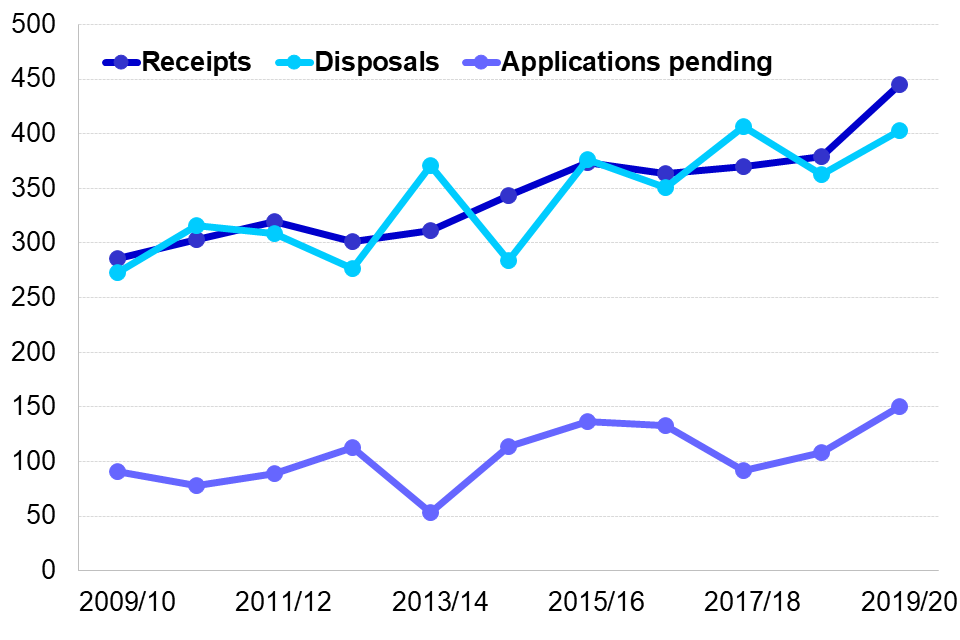
Figure 4.2: Full Gender Recognition Certificates granted by year of birth, 2009/10 to 2019/20 (Source: Table GRP_4)
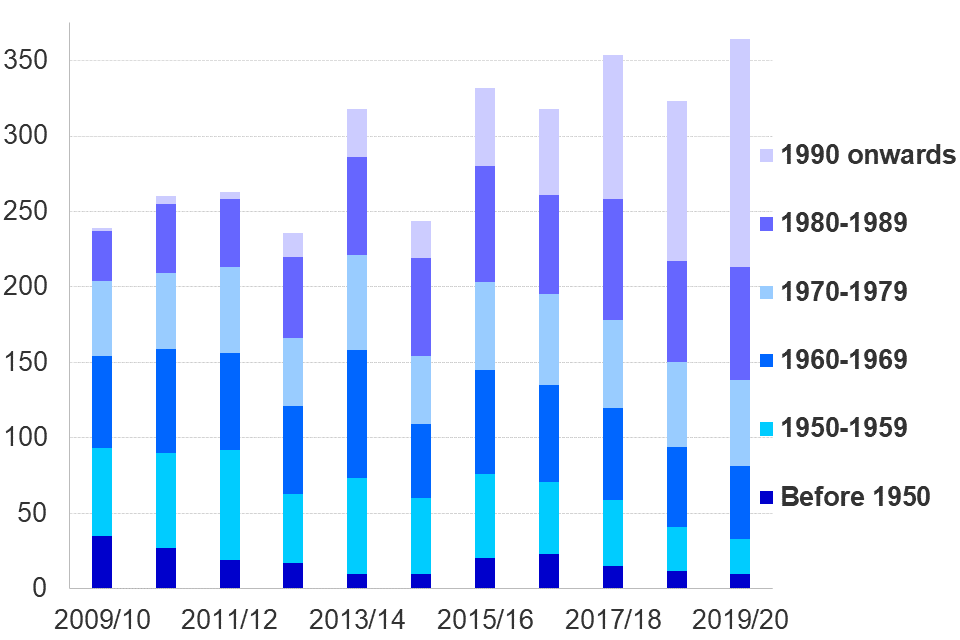
7. Further information
Rounding convention
Figures greater than 10,000 are rounded to the nearest 1,000, those between 1,000 and 10,000 are rounded to the nearest 100 and those between 100 to 1,000 are rounded to the nearest 10. Less than 100 are given as the actual number.
Accompanying files
As well as this bulletin, the following products are published as part of this release:
-
A supporting document providing further information on how the data is collected and processed, as well as information on the revisions policy and legislation relevant to trends and background on the functioning of the tribunal system.
-
The quality statement published with this guide sets out our policies for producing quality statistical outputs for the information we provide to maintain our users’ understanding and trust.
-
A set of overview tables, covering each section of this bulletin and two additional sets of tables on Employment Tribunals (for ET Fee Refunds and ET Management information – Annex C).
-
A set of CSV files including data on overall receipts and disposals CSV, covering all tribunal types.
-
Additional releases this quarter:
- Annual ET and EAT tables covering the representation of claimants in the ET, compensation and costs awarded for discrimination ET appeals and a further breakdown of EAT appeals.
Future publications
Our statisticians regularly review the content of publications. Development of new and improved statistical outputs is usually dependent on reallocating existing resources. As part of our continual review and prioritisation, we welcome user feedback on existing outputs including content, breadth, frequency and methodology. Please send any comments you have on this publication including suggestions for further developments or reductions in content.
Contact
Press enquiries should be directed to the Ministry of Justice or HMCTS press office:
Daniel Mulloy - email: Daniel.Mulloy@Justice.gov.uk
Other enquiries and feedback on these statistics should be directed to the Justice Statistics Analytical Services division of the Ministry of Justice:
Carly Gray - email: CAJS@justice.gov.uk
Next update: 10 December 2020 (URL: www.gov.uk/government/collections/tribunals-statistics)
© Crown copyright Produced by the Ministry of Justice
For any feedback on the layout or content of this publication or requests for alternative formats, please contact CAJS@justice.gov.uk
-
The Q3 2014/15 disposals data point is not included for disposals, in order to aid comparability. This figure was a disproportionately high outlier (index: 24.2) due to the disposal of a large multiple claim against an airline. ↩
-
Advisory, Conciliation and Arbitration Service (ACAS) ↩
-
Note that refund payments may relate to applications made in previous quarters. ↩
-
More information on the scheme is available here https://www.gov.uk/government/news/opening-stage-of-employment-tribunal-fee-refund-scheme-launched ↩
-
Includes: represented by Solicitors, Law Centres and Trade Associations. ↩
-
For those individuals representing themselves, there is no need to provide information on representatives. Therefore, all cases where the representative information was left blank are included here. ↩
-
Costs and compensation are awarded per claim, not jurisdiction. Costs and compensation are allocated to the lead jurisdiction in the claim only. ↩
-
This figure has been revised, but remains provisional, from last quarter’s publication following a review of the process for recording interim certificates and their conversion to full certificates. ↩
